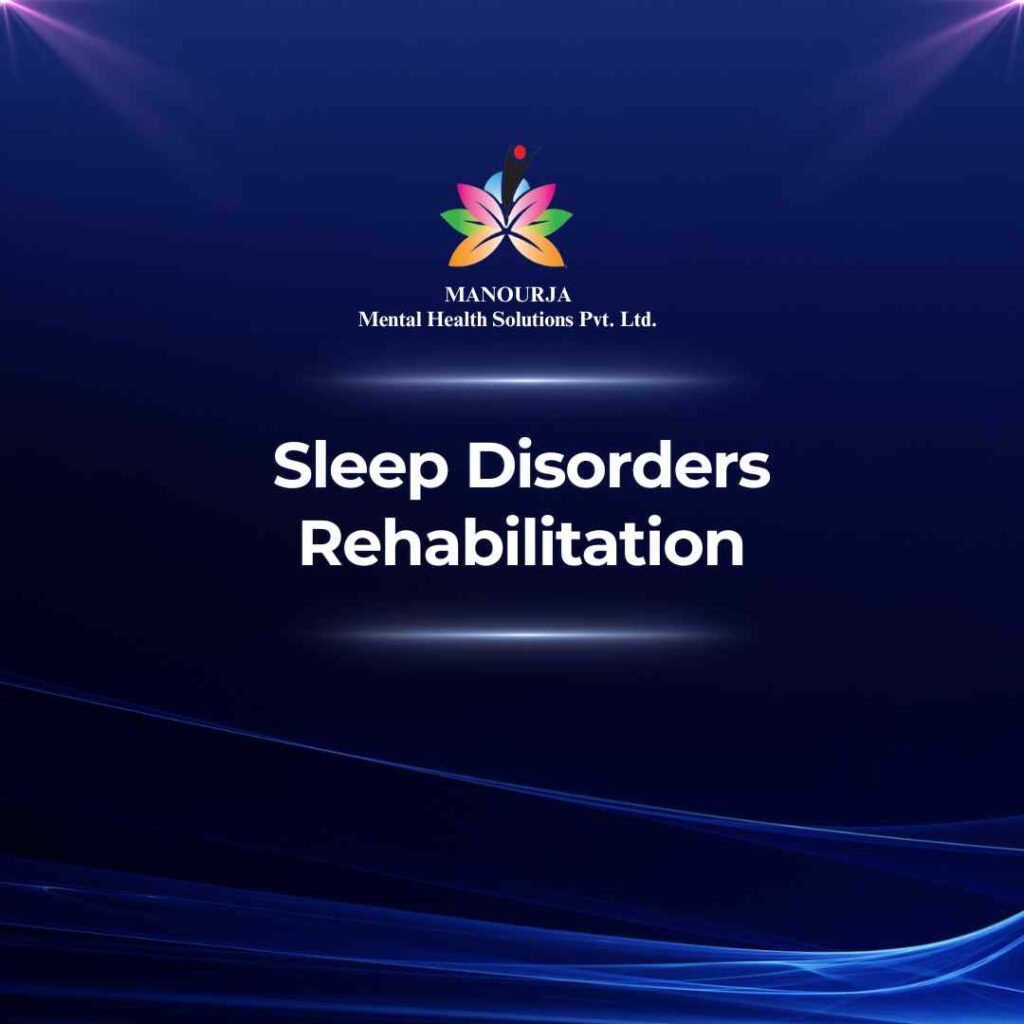Sleep Disorders Rehabilitation

Sleep disorders encompass a range of issues that affect an individual’s ability to sleep well on a regular basis. Whether it’s insomnia, sleep apnea, narcolepsy, or restless legs syndrome, these disorders can significantly impact daily life, leading to long-term complications if not managed properly. Recognizing the signs and symptoms, and determining the appropriate level of care—outpatient (OPD) or inpatient (IPD) psychosocial rehabilitation—is crucial for effective management and improvement of quality of life.
Signs and Symptoms of Sleep Disorders
Individuals and their families should be aware of the following signs and symptoms that may indicate a sleep disorder:
- Difficulty Falling Asleep or Staying Asleep: Chronic insomnia or interruptions in sleep.
- Excessive Daytime Sleepiness: Struggling to stay awake during day-to-day activities, which can be a sign of sleep apnea or narcolepsy.
- Irregular Breathing Patterns: Notable pauses in breathing during sleep, often associated with sleep apnea.
- Unusual Movements or Sensations: Restless legs syndrome or periodic limb movement disorder during sleep.
- Frequent Nightmares or Night Terrors: May be signs of sleep-related disorders.
- Cognitive Impairment: Impaired concentration, memory, or decision-making skills due to lack of restorative sleep.
Indicators for OPD vs. IPD Psychosocial Rehabilitation
Outpatient (OPD) Psychosocial Rehabilitation
- Suitable for individuals with mild to moderate symptoms that do not severely disrupt daily life.
- Effective when symptoms can be managed with routine interventions without daily supervision.
- Appropriate for those who have supportive home environments that facilitate adherence to treatment recommendations.
Inpatient (IPD) Psychosocial Rehabilitation
- Necessary for severe cases where sleep disorders cause significant impairment in physical, mental, or emotional functioning.
- Required if there is a risk of harm to oneself or others due to symptoms of the sleep disorder, such as severe sleep apnea or parasomnias.
- Recommended when intensive monitoring and adjustment of treatment protocols are needed to manage the disorder effectively.
Factors Influencing the Decision
- Severity of Symptoms: The impact of sleep disturbances on the individual’s daily functioning and health.
- Risk of Harm: Potential dangers posed by the sleep disorder during waking and sleeping hours.
- Support System: The ability of family or caregivers to assist with the management of the disorder.
- Previous Treatment Response: Effectiveness of prior outpatient treatments or the need for more structured care.
Role of Psycho-social Rehabilitation in Treating Sleep Disorders
Psycho-social rehabilitation for sleep disorders focuses on several therapeutic strategies to enhance sleep quality and overall health:
- Behavioral Sleep Medicine Techniques: Interventions such as Cognitive Behavioral Therapy for Insomnia (CBT-I) to address behaviors and thoughts that contribute to sleep problems.
- Relaxation Training: Techniques such as progressive muscle relaxation, meditation, or biofeedback to reduce anxiety and promote sleep.
- Sleep Hygiene Education: Teaching about behaviors that improve sleep, such as regular sleep schedules, healthy dietary habits, and appropriate physical activity.
- Management of Comorbid Conditions: Addressing psychological issues like anxiety or depression that may exacerbate sleep problems.
Techniques and Approaches Used at MANOURJA
The rehabilitation process at MANOURJA may include:
- Cognitive Behavioral Therapy for Insomnia (CBT-I): A structured program that helps individuals alter thoughts and behaviors that cause or worsen sleep problems.
- Bright Light Therapy: Used particularly for circadian rhythm disorders to help reset the body’s clock.
- Motivational Interviewing: Encouraging behavioral change through building motivation and commitment.
- Group Therapy: Provides support and shares strategies among individuals with similar disorders.
Steps in the Rehabilitation Process at MANOURJA
- Assessment: Comprehensive evaluation of sleep patterns, medical history, and associated behaviors.
- Personalized Treatment Planning: Developing a tailored plan that includes appropriate interventions based on the specific type of sleep disorder.
- Implementation of Treatment Strategies: Engaging in therapies and behavioral changes as prescribed.
- Monitoring and Adjustments: Continuous assessment of progress and making necessary adjustments to the treatment plan.
- Aftercare and Relapse Prevention: Planning for long-term maintenance strategies to manage and prevent recurrence of symptoms.
Effective psychosocial rehabilitation can significantly improve the lives of individuals with sleep disorders, aiding them in achieving better sleep quality and enhancing their overall mental and social functioning. The comprehensive care at MANOURJA ensures that individuals receive the support needed to navigate their condition successfully and reclaim a restful, productive life.
“Embrace each night as an opportunity to rest, reset, and rejuvenate; tomorrow brings a brighter day.”
